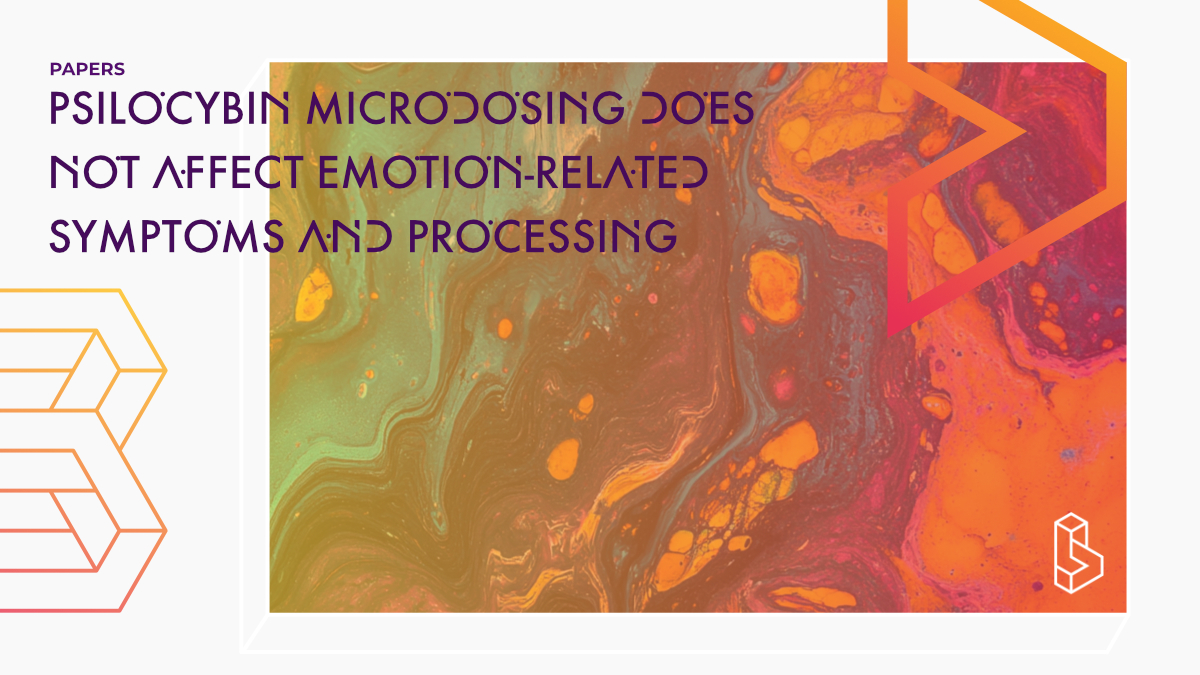This double-blind placebo-controlled microdosing study (n=75) showed that psilocybin microdoses (0.7g dried truffles, 15mg psilocybin, about 1/10th a high dose) didn’t alter self-awareness or modulate emotion processing. The confirmatory analysis also found no effects, but an exploratory analysis showed some reduction of depression and stress in only the first block.
Abstract of Psilocybin microdosing does not affect emotion-related symptoms and processing
“Background: Microdoses of psychedelics (i.e. a sub-hallucinogenic dose taken every third day) can reduce symptoms of depression, anxiety and stress according to anecdotal reports and observational studies. Research with medium to high doses of psilocybin points towards potential underlying mechanisms, including the modulation of emotion and interoceptive processing.
Aims: In this preregistered study, we investigated whether psilocybin microdoses alter self-reported interoceptive awareness and whether repeated microdosing over 3 weeks modulates emotion processing and reduces symptoms of anxiety and depression.
Methods: We used a double-blind, placebo-controlled, within-subject crossover design. Participants completed the Multidimensional Assessment of Interoceptive Awareness Questionnaire 1½ h after self-administering their second dose (or placebo), and the emotional go/no-go task and the shortened Depression Anxiety Stress Scale 1½ h after self-administering their seventh dose.
Results: Our confirmatory analyses revealed that psilocybin microdosing did not affect emotion processing or symptoms of anxiety and depression compared with placebo. Our exploratory analyses revealed that psilocybin microdosing did not affect self-reported interoceptive awareness, that symptoms of depression and stress were significantly reduced in the first block compared with baseline, that participants broke blind in the second block and that there was no effect of expectations. Further research in a substance-naïve population with clinical range anxiety and depressive symptoms is needed to substantiate the potential beneficial effects of microdosing.”
Authors: Josephine Marschall, George Fejer, Pascal Lempe, Luisa Prochazkova, Martin Kuchar, Katerina Hajikova & Michiel van Elk
Summary of Psilocybin microdosing does not affect emotion-related symptoms and processing
Marschall and colleagues begin by discussing the increasing popularity of microdosing psychedelics over the last decade. They explain that microdosing typically involves ingesting a sub-hallucinogenic dose of a psychedelic substance, usually 5-10% of a standard dose, every third day. The authors note that psilocybin and LSD are the most common psychedelics used for microdosing, and users often follow the Fadiman protocol, which suggests dosing every third day to achieve optimal effects.
The researchers highlight that while anecdotal reports and observational studies suggest microdosing can have antidepressant and anxiolytic effects, the available evidence regarding its efficacy for mental health remains inconsistent. They point out that three of the four existing experimental studies on humans found no evidence for the alleged antidepressant and anxiolytic effects, while the fourth found that 20μg LSD increased positive mood but also anxiety.
Marschall and colleagues explain that their study aims to reconcile some of these inconsistent findings through a combined field and lab study design. They investigated the effect of psilocybin microdosing, compared with placebo, over the course of 3 weeks, at one consistent dosage, on humans. The researchers focused on measuring self-reported changes in mood and anxiety, as well as exploring potential underlying mechanisms of the alleged anxiolytic and antidepressant effects: emotion processing and interoceptive awareness.
Find this paper
https://doi.org/10.1177%2F02698811211050556
Open Access | Google Scholar | Backup | 🕊
Cite this paper (APA)
Marschall, J., Fejer, G., Lempe, P., Prochazkova, L., Kuchar, M., Hajkova, K., & van Elk, M. (2022). Psilocybin microdosing does not affect emotion-related symptoms and processing: A preregistered field and lab-based study. Journal of Psychopharmacology, 36(1), 97-113.
Study details
Compounds studied
Psilocybin
Topics studied
Microdosing
Study characteristics
Placebo-Controlled
Double-Blind
Within-Subject
Participants
75
Humans
Authors
Authors associated with this publication with profiles on Blossom
Michiel van ElkMichiel van Elk is an Assistant Professor at the unit Cognitive Psychology of the Institute of Psychology, at Leiden University.
George Fejer
George Fejer is a Research Assistant at the Religion Cognition & Behavior Lab, investigating the placebo effects of psychedelics related to prior expectations, personality traits, and the set and setting. He is also working as a team coordinator of ALIUS, an interdisciplinary collaborative network of researchers, involving neuroscientists, psychologists, philosophers of mind, psychiatrists, and anthropologists, who are dedicated to the development of a systematic and scientific model of consciousness supported by both theoretical work and experimental studies.
Compound Details
The psychedelics given at which dose and how many times
Psilocybin 0.7 gLinked Research Papers
Notable research papers that build on or are influenced by this paper
Effects of psilocybin microdosing on awe and aesthetic experiences: a preregistered field and lab-based studyThis double-blind placebo-controlled study (n=30) found that microdosing psychedelics (psilocybin; 1.5mg; 5-7 doses) increased awe but not aesthetic experiences (e.g. viewing art). Many participants knew which group (receiving placebo or psilocybin in which timeframe) they were in ('breaking blind') and the researcher presume that expectancy-effects may explain the effects found.

